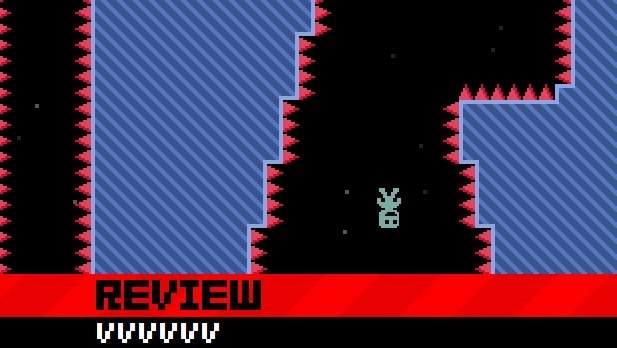Upon reading the list of 2010 IGF finalists, I had only one question: where the f*ck was VVVVVV?
I know it’s bad form to admit your opinion of a game before entering the review proper, but I’ll just come out and say it — VVVVVV is one of the best platformers I’ve played in a long time.
It’s a little bit mind-bendy, a little bit experimental, a little bit nonlinear, and a lot-of-bit challenging. It’s also very much worth its meager asking price.
I’ll explain why, after the jump.

VVVVVV (PC)
Developer: Terry Cavanagh
Publisher: Terry Cavanagh
Released: January 10, 2010
MSRP: $15
You know those indie platformers that seem to predicate themselves almost solely on how difficult they can be, but remain weirdly playable nevertheless? Games like Flywrench, or N+? VVVVVV is kinda like that.
It’s also nothing like them.
You know those nonlinear exploration games like Small Worlds or Super Metroid? VVVVVV is also kind of like, (and completely, utterly unlike) those games as well.
The premise is as follows: a ship full of six funny-looking dudes named after colors starting with the letter V (Violet, Vermillion, etc) crash-lands in an unknown dimension and accidentally separate. As the ship’s captain, or something, it’s your job to find the rest of your crew and fix your ship.
After rescuing the first crew member, you’re free to find the other four in any order you like. Each crew member can be found at the end of their own special set of ball-busting challenge levels, each set playing differently from the last. To save one crew member, you’ll have to navigate a Pac Man-esque maze where exiting the left side of the screen makes you appear in roughly the same spot on the right side of the screen; to save another, you’ll have to survive a vertically scrolling gauntlet of spikes and tunnels.

This level structure will be familiar to anyone who played Braid, or World of Goo: introduce a single game mechanic, and keep forcing the player to use that mechanic in as many different ways as possible. Where those games were puzzlers above all else, however, VVVVVV is a challenge-based platformer through and through.
Your character has one ability, and one ability only: by pressing the V key, you can invert gravity. That’s it. But it’s more than enough. Even ignoring the fact that it’s just plain cool to play as a character who can leap a mile into the air with absolutely no problem but can’t so much as hop over an inch-high step on his own, Cavanagh wrings an astounding amount of gameplay out of a mechanic that, in the hands of a less talented level designer, would amount to nothing more than a gussied-up doublejump. The level design constantly had me smiling in impressed surprise; with only a few different mechanics, Cavanagh continually creates new and fresh stages that often feel entirely different than those which preceded them.
In exploiting the gravity-inversion mechanic, Cavanagh wisely makes sure to provide an experience which is incredibly difficult, but never feels punishing. You’ll die a lot, yes, but your character respawns instantaneously and you’ll never have to redo more than five seconds of platforming to get back where you were. Much like Mark Essen’s Flywrench, VVVVVV understands exactly how hard it is. The game takes every precaution to simultaneously maintain that difficulty and allow the player to celebrate in triumphing over it, while still minimizing what Jesper Juul refers to as the “total failure cost.” Even though you’ll probably die at least a thousand times before completing VVVVVV, the game never feels even remotely unfair or condescending.
Linear challenge levels aside, the game’s nonlinear overworld deserves special mention. While I almost never feel compelled to explore 100% of a map, I couldn’t help but do exactly that before writing this review. The simple act of map exploration is so easy and satisfying that there’s really no reason not to.

The teleportation system and massively useful gravity inversion mechanic allows you to travel long distances with remarkable speed (none of that Shadow Complex “take five minutes to run from one end of the map to the other cause I forgot a gold bar” crap), and the overworld traversal actually requires slightly more strategic thinking than the reflex-heavy linear stages.
Not to mention that the twenty collectible trinkets strewn throughout the game are often hidden behind some of the most imaginative, challenging, and satisfying puzzles in the entire game. Even if you don’t wanna go through the trouble of collecting them you still can, a la Eufloria, unlock any of the extra game modes and “secrets” via the options menu. I’m really digging the whole “you paid for it, so you should be able to decide when you want to unlock stuff” mentality, and considering how difficult some of the trinket puzzles can be, VVVVVV definitely benefits from it.
Cosmetically: the graphics are charming if not gorgeous, the room names are funny, and the music is fucking spectacular, especially if you’re into chiptunes.
In the end, I can’t say enough good things about VVVVVV. It’s Terry Cavanagh’s best game to date, and one of the best platformers I’ve ever played. If you have any interest in challenging platformers whatsoever, you’d be doing yourself a disservice not to pick up VVVVVV.
Score: 10 — Flawless Victory (10s are as close to perfect as you will get in a genre or on a platform. Pure, untarnished videogame ecstasy.)



